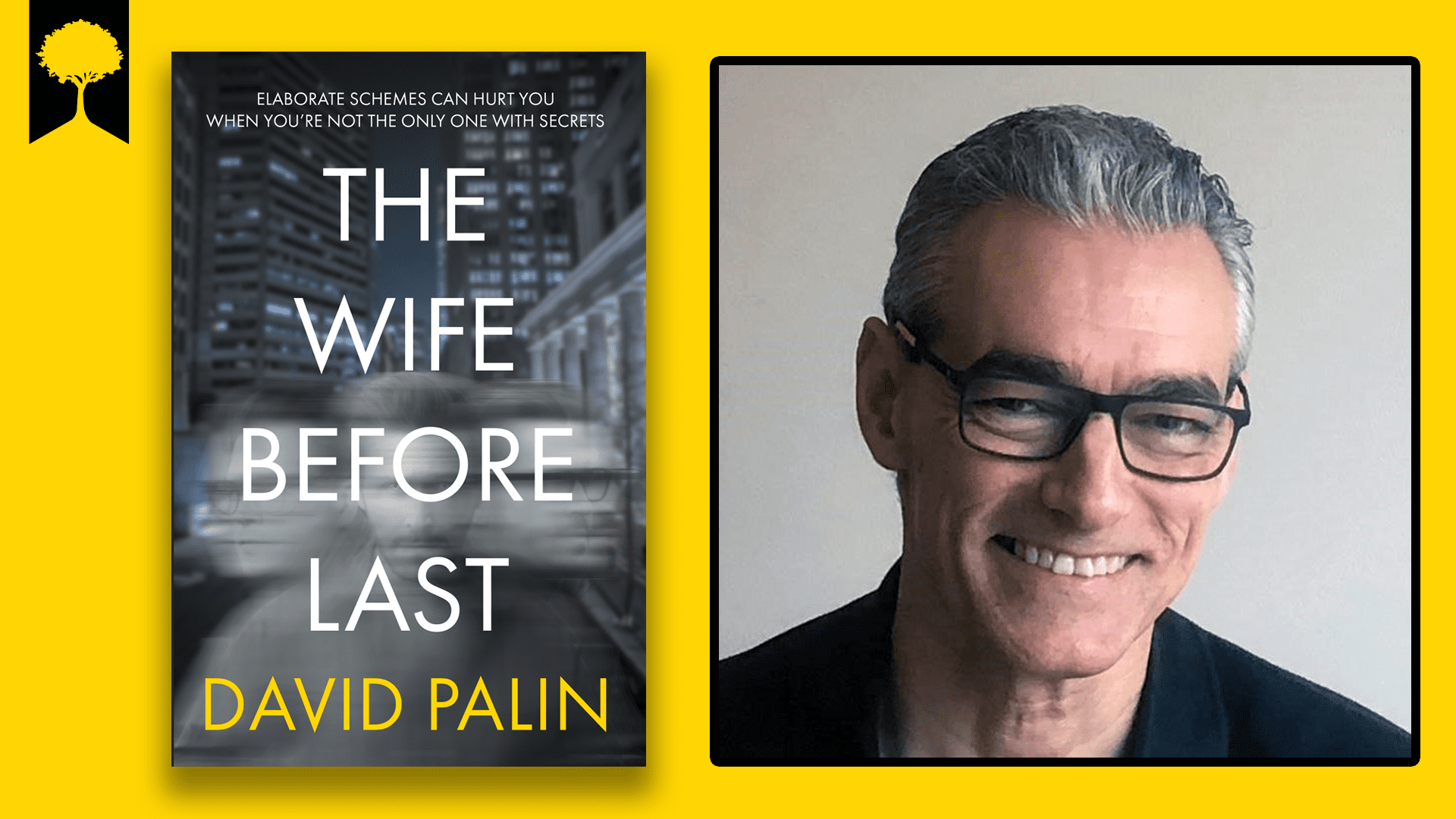
David Palin’s ‘The Wife Before Last’ is a globetrotting white-collar thriller that begins amidst the fall of the Berlin Wall and takes a trio of former Stasi agents into the British criminal underworld. A slick and suave story embedded within a web of deceit and secrecy, ‘The Wife Before Last’ follows Richard, Michael, and Marcus. Michael and Richard still live and breathe the violence that got them where they are, but Marcus is different.
Marcus leads a treacherous double life. Exploiting the vulnerabilities of affluent women, he orchestrates elaborate schemes to line his pockets with ill-gotten gains. But when one of his schemes spirals out of control, Marcus finds himself hunted by those he once called partners. Knowing that every move could be his last, Marcus’ only goal is to remain one step ahead of his former friends.
‘The Wife Before Last’ will be published May 23rd 2024. Order your copy here.
Hi David. Let’s start at the beginning. What inspired you to write ‘The Wife Before Last’?
Like most of my novels, a chance incident or comment just gets me thinking, then a story spirals out from that. In this case, I jotted down a comment made in a meeting at a previous place of work, regarding someone owing the company money under unusual circumstances. It mushroomed from there!
Can you give us a thirty-second pitch on the book?
Marcus, a former Stasi officer now criminally active in the UK, is about to learn that no-one is who they seem. A master of online disguise, he uses his abilities to scam money from unsuspecting women, but he discovers, there is a reason that history is full of vengeful goddesses. One woman with a disguise, a dark secret and an agenda of her own means he must run for his life – and not just from her.
‘The Wife Before Last’ introduces readers to three characters: Richard, Michael, and Marcus. How does their dynamic evolve and change throughout the story?
These three see themselves as a unit; a cabal. Marcus was the least suited to the rather dystopian world of the former East Germany, whereas its militaristic, structured society worked perfectly for power-hungry Richard and Michael. The latter have established themselves in the UK underworld by a combination of money smuggled in and thuggery. Marcus is more internet savvy, establishing his connections and pursuing his activities mostly through that medium. His actions and success lead him to become more secretive, whereas the others continue to rely on threats and violence. It drives an invisible wedge, but when something brings an element of Marcus’ activities into the light of day, it means trouble!
The spotlight may initially fall on the book’s three male leads, but what can you reveal about Jessica, Katherine and some of the other strong female characters featured throughout the story?
Jessica and Katherine are identical twins, yet so very different. Jessica is an achiever in business and a tough cookie, courtesy of a previous career in the fire brigade. She feels a great sense of responsibility for Katherine, who has Aspergers, since their parents passed away early. However, running her successful company means she cannot monitor the passionate Katherine at all times, which has major consequences. The other female characters have big personalities and find themselves, for various reasons, in financially strong positions, but each has the same Achilles Heel – the absence of someone making them feel special. This is something Marcus has learnt to play on to his benefit, but when a horrific event draws them into each other’s company, their eyes are opened.
The fall of the Berlin Wall is central to the story of the three men. How does this iconic historical event shape Marcus, Richard and Michael?
The plot takes place many years after the fall of the Wall, but I think it’s an event that shapes the outlook of the three characters who escaped. As members of the Stasi, they had power in the former East Berlin, but it had obvious restrictions, so once they were away from that, the UK offered a menu of opportunities on which they wanted to gorge themselves. Having been to Berlin pre- and post-Wall, I could see just how the merging of two different mindsets could have both positive and negative impacts.
The trio flee Germany and enters the British criminal underworld. What kind of research did you do to flesh out this area?
Obviously, I didn’t start poking around into criminal activities! I think the world in which we live shows that online activity can provide anonymity. Even bona fide activities could prove risky without having to resort to the dark web.
Like many people, I have used dating websites in my life. I remember encountering people who were looking to enter relationships for reasons other than romance. That’s just one example, but readers of this novel will observe others. Social media opens doors too, and some should remain shut, as Marcus discovers.
Marcus infamously leads many double lives. Can you tell us more about that?
As this would give away some of the plot, let’s just say the internet is a treasure chest full of such opportunities for multiple identities, but it can also be Pandora’s Box.
‘The Wife Before Last’ is ostensibly a white-collar thriller, but can you discuss any of the other themes that have been woven throughout the story?
The novel examines several elements of modern society, but also some eternal themes which, for better or for worse, have stood the test of time. In terms of the latter, we see betrayal and revenge, sibling love and rivalry, the irresistible and often destructive power of sexual attraction, and the battle between brute force and mental acuity. The all-pervasive influence of technology is shown as unavoidable, but a double-edged sword.
Fame, is, as always, a mixed blessing – both cathode and anode in its electrolytic cell – as one character, a female author, discovers; the internet makes it so much quicker to achieve fame, but hiding from its shrapnel brings her remoteness and danger.
Your books are known for their occasionally labyrinthine plots. With a plot as intricate as this, was it difficult to map out the story and make sure that everything within the book was tied together nicely?
At the writers’ workshops I run, I have discussed my need to step back sometimes and draw a timeline, to help overcome what I call plot-knots. I believe stories have a certain organic life of their own. If you create believable characters and allow yourself to be absorbed into them, then they will sometimes be subject to the vagaries of life, or its changes of momentum. That is fine, as long as the logic isn’t lost; hence the timelines. It’s fun and a good challenge. Let’s put it this way – if the author gets misled, the reader gets a mystery!
Are there any specific literary influences or inspirations that shaped the style or tone of ‘The Wife Before Last’?
The story was shaped more by my travels than my reading habits. I studied English and German at university, so there is bound to be some innate referencing of works. Having lived in Germany, the darkness that pervades some of the literature will have impacted me.
I love the novels of Robert Harris and I guess reading them showed me how that whole post-war period after World War Two – a world traumatised and full of secrets which have only crept into the daylight as the decades have passed – is ripe with material for thrillers. As I mentioned before, a city like Berlin, with people literally divided by a wall, evokes a feeling of surrealism.
Figuratively, lockdown, during which time I put much of this story together, added to that feeling of humanity divided. It’s ironic that prior to lockdown, I invented a bar near Camden Lock as a setting for part of the action, and called it Lockdown!
Finally, as you’ve said earlier, we want to avoid spoilers. However, can you tease any unexpected twists or turns readers can expect to encounter in the book?
I think it will be fun for readers to work out who is really who in this novel. Who can they trust and who not? Will they find themselves siding with someone, only to want to see that character fall? How will they define the lesser of two evils? Will they want someone to succeed because they hate them less than someone else? I hope they enjoy it.
‘The Wife Before Last‘ by David Palin is published by Matthew James Publishing on May 23rd 2024.

